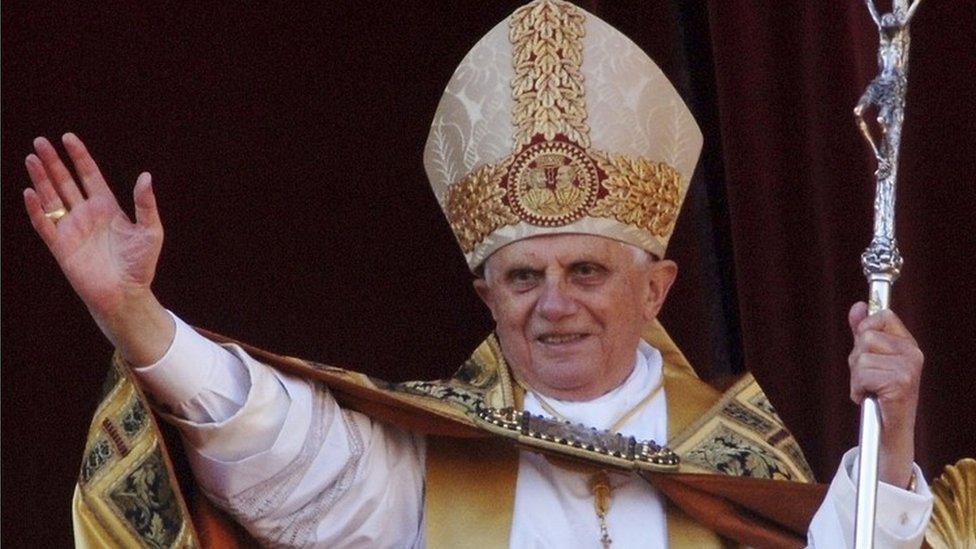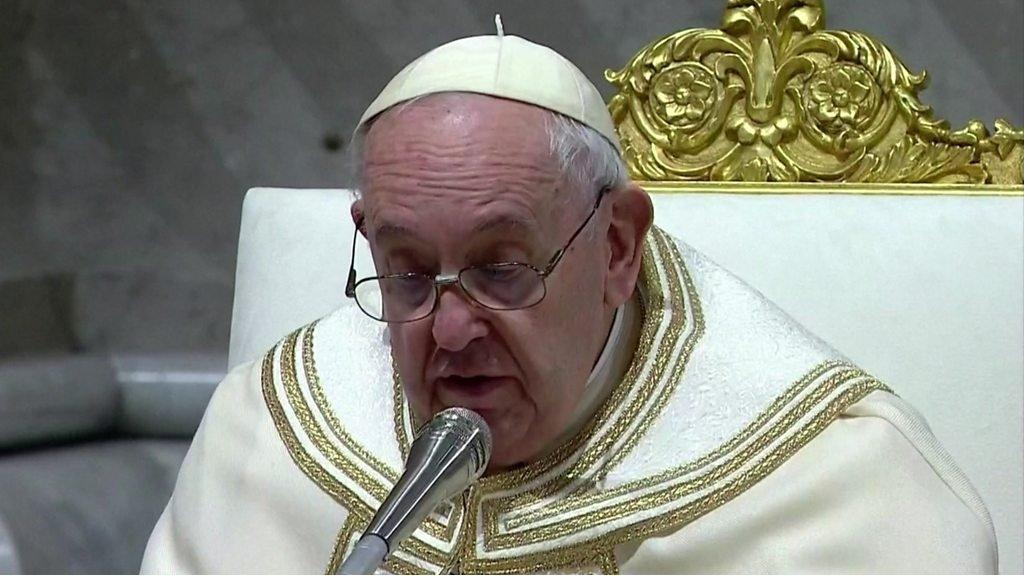Pope Francis and world leaders pay tribute to Benedict XVI
- Published
Watch: Pope Benedict XVI through the years
Pope Francis has led tributes to his predecessor, Benedict XVI, who has died, aged 95.
Benedict had been "noble" and "kind" - and "gifted" to the Roman Catholic Church, the Pope said.
US President Joe Biden and Brazilian President Lula are among dozens of leaders to praise the former pontiff.
Benedict resigned in 2013 because of poor health - the first pope to do so in 600 years. His funeral service will be held at the Vatican on 5 January.
The 265th leader of the Catholic Church, Benedict was a controversial figure. While some mourners hailed him resolute defender of the faith, others criticised his tenure for a failure to tackle allegations of the clerical sexual abuse.
But hours after the announcement of his death, Pope Francis praised his "dearest" predecessor, emphasising "his sacrifices offered for the good of the Church".
In the US, the White House released a statement from President Joe Biden - who is only the second Catholic after John F Kennedy to hold the nation's highest office.
Recalling spending time with Benedict at the Vatican in 2011, the president said that he would "be remembered as a renowned theologian, with a lifetime of devotion to the Church, guided by his principles and faith".
Leaders of countries with large Catholic populations across the world also paid tribute, with Italian Prime Minister Giorgia Meloni hailing Benedict as a "giant of faith and reason" and "a great man whom history will not forget".
Ireland's Taoiseach Leo Varadkar described the former pope as a "humble worker in the vineyard of the Lord".
In Brazil - the largest Catholic nation in the world - incoming President Luiz Inácio Lula da Silva said he wished "comfort to the faithful and admirers of the Holy Father".
And his predecessor - President Jair Bolsonaro - hailed Benedict's "masterful work as a great theologian" and said he left an "immense legacy for the Catholic Church, for all Christians and for humanity".
Watch: Pope Francis expresses thanks for the life and service of Benedict XVI
In the UK, the new monarch King Charles III said that he received news of the former Pope's death with "deep sadness".
Sending a message of condolence to Pope Francis, he highlighted Benedict's "constant efforts to promote peace and goodwill to all people" and his actions to strengthen bonds between Catholics and Anglicans.
Prime Minister Rishi Sunak called Benedict XVI "a great theologian whose UK visit in 2010 was an historic moment for both Catholics and non-Catholics throughout our country".
The head of the Catholic Church in England and Wales, Cardinal Vincent Nichols, said Benedict transformed his image in the UK when he visited.
Speaking to the BBC, Cardinal Nichols said he arrived with a reputation of being "God's Rottweiler", but left being compared to "everybody's favourite great-uncle or just uncle".
UN chief Antonio Guterres praised the former pontiff for his "tenacious commitment to non-violence and peace".
Germany's Chancellor Olaf Scholz described the late pope as "a formative figure of the Catholic Church, a forthright personality and a clever theologian".
Benedict was born in Bavaria as Joseph Ratzinger and in 1977 was appointed archbishop of Munich.
Reaction to his death in the city was varied - with one resident describing him as "conservative", while taking pride from the fact that he was German.
Another was more critical.
"I thought when he came to power he would finally bring some fresh air into the Catholic Church and bring an end to celibacy. But unfortunately, he disappointed me," Christa Herwig told Reuters news agency.
In 2019 Benedict blamed clerical sexual abuse on the sexual freedom of the 1960s and the rejection of God's teaching.
For much of his papacy, the Catholic Church faced allegations, legal claims and official reports into decades of child abuse by priests.
Earlier this year the former pope acknowledged that errors had been made in the handling of abuse cases while he was archbishop of Munich between 1977 and 1982.
The admission came after a German legal probe into the Catholic Church alleged that he failed to act over four child sex abuse cases.
In a letter released by the Vatican, the former pontiff asked forgiveness for any "grievous fault" but denied personal wrongdoing.

Change and respect

With the death of Pope Benedict XVI the Catholic world has lost an unrivalled receptacle of theological knowledge, intellectualism and lived experience.
While little has changed in terms of doctrinal discussion at the Vatican in the nearly 10 years since he stepped down, what has changed is the spirit of the papacy.
Pope Francis is widely regarded to have had a more pastoral approach and his appointments of cardinals show a clear shift towards Asia and Latin America.
In recent years, though he has not appeared to court it, the Pope Emeritus became something of a lightning rod for some opposed to the new Pope.
There had been speculation that Pope Francis, who himself has been suffering ill health, had been contemplating stepping down, but was reluctant to do so if it meant there would be three popes in Rome.
It was not quite "The Two Popes", but in spite of their differences, there was by all accounts immense respect shown between predecessor and successor. We are likely to hear about that in the coming days and particularly in Pope Francis's homily at the funeral on Thursday.
- Published31 December 2022

- Published31 December 2022
